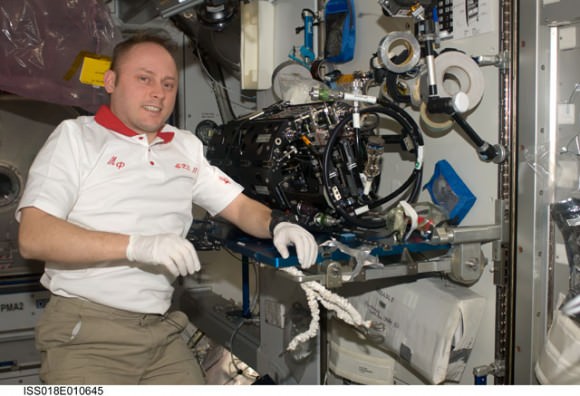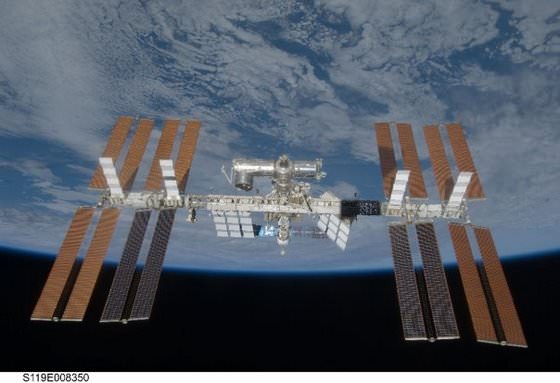[/caption]
Fifteen partnering nations have agreed in principle to extend the life of the International Space Station, and keep it operating through 2020, according to an article in the Wall Street Journal. That is at least five years beyond the current deadline. Until now, the major partners – NASA, ESA and the Russian Space Agency – hadn’t committed to keeping the station operational past 2015, and questions loomed about the future of the ISS and its worthiness as a platform for scientific research. An extension could give new momentum to science, but may force NASA to siphon money away from other projects – like the new Constellation program – in order to pay for the additional years of operation.
The ISS has been under construction since 1998 and over the life of both designing and building the orbiting outpost, costs have crept upwards of $100 billion USD. But some feel that prolonging the facility’s life, particularly in the midst of the current global economic turmoil, could also force some tough questions within NASA. Adding five more years to the life of the ISS could cost about $10 billion or more between 2015 and 2020. NASA’s annual budget is around $18 billion, less than .7% of the US’s national budget.
Additionally, some members of Congress are looking to extend the life of the shuttle to avoid the five year gap (2010-2015) between shuttle retirement and the first human mission of the Ares/Orion combo, and Constellation’s goal of returning humans to the moon faces potentially significant delays unless Congress provides additional funds for NASA’s budget.
But does NASA put all the money towards building the space station and then abandon it? Neither Congress nor the White House wants the political flak for cutting off station operations without reaping the benefits of prior spending. Decisions have been complicated by the fact that arguments between the White House and some lawmakers have held up nomination of the next NASA administrator.

A NASA spokesman said last week that the agency is developing cost estimates for extending station operations through 2020 “in the event the [Obama] administration decided to propose” that option in future budget requests. The agency also said that in the meantime, it “continues to take no steps that would preclude extending station operations.”
The international partners agreed that keeping the station operating past 2015 doesn’t “pose any significant technical challenges” and space-agency heads “committed to work with their respective governments” toward that goal, according to a NASA official.
NASA’S counterparts in Russia, Japan, Canada, various European countries and most of the other partners are eager to maintain political support and funding for the station. Space agencies around the globe believe the 2020 date is “an eminently logical goal” and “momentum is heading in that direction,” according to a source quoted in the Wall Street Journal. In order for an extension to become official, individual governments must formally agree and come up with a funding plan.
The ISS has provided promise of scientific breakthroughs in areas from medicine and biology to manufacturing microelectronic components. Scientists say the lack of gravity will provide new insights into molecular structures, cell activity and medical issues such as loss of bone density. Some of the first advances have already begun with recent findings of how salmonella poisoning forms in food and how human cells react to vaccines in space.
The Obama administration hopes the station’s extension will spark further international cooperation on space endeavors and scientific research. When the station crew grows to six in May, experiments this summer will look at how gravity may affect biofuels and for “what could possibly be a vaccine for multiple viruses,” said Joy Bryant, the head of Boeing Co.’s space-station team. “We’re just now beginning to see the full potential” of the research, she told reporters at a recent industry conference.
Source: Wall Street Journal


Ah, at last good news on this.
It makes perfect sense to build a space station and then not abandon it as soon as it’s built. Although the whole construction process in itself taught us many valuable lessons for the future, these 10 years will be a chance to finally do some major scientific work up there.
And in any case, the economy will recover, well before the operational life of ISS becomes an issue, so ‘prolonging the facility’s life, particularly in the midst of the current global economic turmoil’ should not be a major consideration here…
Of course, there are those who think that if we abandon ISS, we could focus on the ‘more important’ business of getting back to the Moon (if they’re not shouted down by those who also have the ‘been there, done that’ attitude about the moon, and want to get to the ‘more important’ business of getting on to Mars. And mark my words, after 3-4 Mars missions, it’ll be ‘enough of that, we HAVE to concentrate on humans to the moons of Jupiter!’), yet we still can’t put people and stuff into LEO cheaply, reliably and regularly, which has been ISS’s *real* problem. We just cant *get* to it well enough to take full advantage of it.
I’m all for being on the bleeding edge of human exploration, but it’s JUST as important to leave practical infrastructure behind as we go. Otherwise it’ll be like putting a gallon jug on a wine glass: A lot of requirements on an unsustainable base, flag-and-footprint planet hopping until the public won’t support it (if you’re old enough to really remember Apollo, you know it can happen), and no economical space access infrastructure wherein business might follow behind.
Ares/Orion ‘replacing’ the Shuttle? Oh. please.
Yes its day is almost over, but the ‘replacement’ needs to be a better (and not necessarily the same size) RLV that can go to ISS and other LEO destinations daily, not another ballistic capsule on an expendable.
We’ll never be ‘finished’ with LEO just because we can go back to the Moon, ‘finished’ with the Moon just because we can go to Mars, ‘finished’ with Mars just because…etc.
I totally agree. We spent all the freaking money and time building the thing…we need to figure out a cost effective way to use the hell out of it.
Well, it kept the Industrial Complex busy and provided a target to Shuttle back and forth. Industrial Complex now has a new target to get money (Going Back To The Moon!). No suprise we have a massively large and unused space station. I’m glad UK doesn’t spend money on astronauts. I used to be a big fan of manned space research. Seeing how little Science was done on the IIS (compared to Mir, for example), I am suprised it’s even close to being finished. One of the “Turn of the Millenium bets” I’ve placed was IIS being never properly finished. It looks like as soon as it is big enough to have some Science done, US is abandoning it and I find it very implausible for ESA to convert its ATV to a manned vehicle fast enough before IIS falls apart.
For the cost of this white elephant, ESA and NASA could have had many space telescopes and many many more land-based ones.
Hakan, but then we wouldnt have had stories about the urinal system.
Loved those.
We never should have built the ISS…but since we did…let’s not do a skylab and kill kangaroos…
Agree kcuhC… A waste of money in a world where space funding is rather low. In a perfect world, it would have been a fun project. But now that we dropped 150 billy on it, lets use it up like Mir..
Remember that we traded a manned mars landing for this space station, so lets take full advantage.
You betta keep me yo! Oh hellz no you ain’t gonna drop me likes you did Skylab…I ain’t down with that…and I ain’t down with that literally.
Vote ISS 2020 and infinity
It’s like taking years to build a house by hand, and then after it’s completed, say “I think I’m just going to live here a few years, and then burn it to the ground.”
It makes no sense.
The space station is nice and all… but do we really want to give up the moon again?
Constellation is continuing on the work that should have been accomplished by Apollo all those years ago. I’d really hate to see us lose out on this a second time.
In this situation I’d think the best solution would be to make funding happen for both projects. Not forcing NASA to choose between two important endeavours because we can only do one thing at a time.
I say rent it to the private sector.
Just shut Nasa down. America no longer has the nuts to go into space and frankly I’m tired of all the whining about it. Just quit, after a few years no one will remember we hand gone there at all. Save the embarrassment of begging others for rides, licking Congressional boots for enough funds to send a probe or two out, really it takes all the fun, vision, and morale out of it. What we need is more welfare, “earmarks”, bridges to nowhere, boondoggle mandated ethanol programs, studies to find why a green grasshopper’s ***hole is red. You know, really important stuff.
What is the ISS for actually? I wish I could see the point of it because I think space exploration is important for emotional and scientific reasons. But, try as I might, I just can’t. The little we have learnt has come at a high price. We could have had a 100m telescope (or several), we could have had humans on Mars exploring, or on the moon again. There’s almost no limit to the things I would personally prefer to have spent the money on.
I think it’s time for the partner agencies to quietly ramp it down in favour of other projects. I say quietly because it WAS a valiant effort, and I would never belittle the great engineering and science done by all those dedicated people – not to mention the bravery of the astronauts.
But, for my money – and some of IS my money – I would view an extension as throwing good money after bad. Well, not bad exactly, but not great either.
wat ever